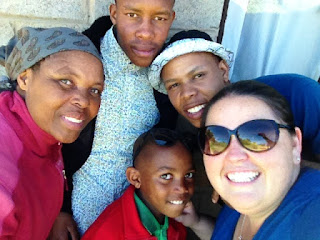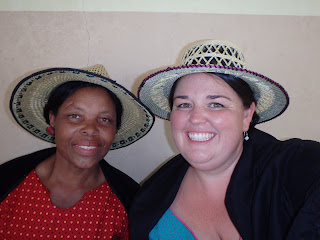Dear 2014 Beth,
You are about to embark on an incredible experience. Stop worrying about what you are going to pack and stop wasting money on clothes to last you for the next two years. They literally sell clothes on the street in Lesotho. Do not fret about the investment in quality footwear though, you will wear out four pairs of shoes in the next few years. Also, the solar panel is a brilliant investment.
Instead, keep doing what you are doing. Maximize your time making memories with family and friends before you go. Invest in them as those relationships will sustain you through more than you imagine in the next few years. You are about to experience more happiness and pain than you knew was possible.
 |
| Just a typical day in Ha Rasekila at work with the women in the community group. |
When you finish training and it is time to buy things for your new home, please buy the kitchen table you dream of. Do not let anxiety about surviving on the small Peace Corps living stipend keep you from this splurge. You will want that table for longer than you initially plan to be in Lesotho.
People will wonder at how you live without running water or electricity. In reality, going without those things is not what makes Peace Corps challenging. Spending money on data for Whatsapp calling and voice notes is always worth it. This is not a travel adventure. You will spend twice as long removed from your American family and friends as anticipated. Maintaining those relationships is worth the absurdly small investment in data bundles.
 |
| Remembering to stop and enjoy the goofy moments of life with my great friend Luwi. |
You will be in Lesotho a long time. In the end, your closest friends and supporters will be the host country nationals you get to know. Invest more time and energy in those relationships sooner instead of in the comfort of American peers.
Drinking Ricoffee (instant chicory root coffee) for the first six months is not worth the savings. Stock up on filter coffee that one time you shop in the capital. It is not integration to deprive yourself of this small luxury.
Take more photos of the everyday moments of your life and fewer photos at events. Some day you will return home and want to share the mundane aspects of life with people.
Trips home to visit family and friends are always worth the travel time, jet lag, and money. You will get to meet your infant goddaughter, see your ailing father, and keep relationships strong even after you decide to double down your PC service. Learn from the Basotho culture and put people first when your friend calls to announce and celebrate her engagement, promise to attend the wedding right then instead of changing your mind six weeks before the wedding.
Your house will be your comfort zone and break from the challenges of living in a foreign language and culture, but get outside of it! Walk around the community and greet people, go to community meetings and events, do your chores outside. Loneliness is of your own making. There are a ton of people just outside your door eager to welcome and befriend you. With time, your community will become your comfort zone. After you move away, returning to see them will be the best homecoming you can imagine.
 |
| My Basotho family has been a huge part of my life and experience. I am so blessed to have been welcomed into their lives. |
You will spend a large part of the next four years being uncomfortable. In your first year, it will feel like a great adventure even if some days, you will lose the battle and hide in your house. Although you will gain experience and get used to a lot of things, even after four years, you will still have moments that you have no idea what is going on, what someone is telling you, or what is expected of you. That is just the reality of life in another culture. Embrace it because those uncomfortable moments often open you up to some of your greatest experiences. You are not moving around the world to be surrounded by the familiar and easy.
Right now, you have days that you question whether you are doing the right thing by moving around the world for two years. When you receive your Sesotho name from your first host family, you will be reassured that you are where you belong as they explain in great depth that your new name means "God's will." You will question everything again during your first extension when you are blindsided by incredible loss and, ultimately, you will recognize that every step of your life's journey was leading you to Lesotho.
 |
| With the two men who have had the greatest influence and impact on my life in Lesotho. |
In four years, when it is finally time to return to America, you find yourself right back where you are right now. You will wonder if leaving home and going to the US is really right path for your life. Have faith. In another four years, you can write yourself an updated version of this letter. It will, undoubtedly, be full of reassurances and growth. Until then, embrace people and experiences. Make the most of every moment.
With love,
Thato, 2018



































